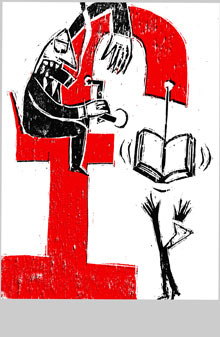Academic publishers charge vast fees to access research paid for by us. Down with the knowledge monopoly racketeers
George Monbiot, guardian.co.uk, 
'Though academic libraries have been frantically cutting subscriptions to make ends meet, journals now consume 65% of their budgets.' Photograph: Peter M Fisher/Corbis
Who are the most ruthless capitalists in the western world? Whose monopolistic practices make Walmart look like a corner shop and Rupert Murdoch a socialist? You won't guess the answer in a month of Sundays. While there are plenty of candidates, my vote goes not to the banks, the oil companies or the health insurers, but – wait for it – to academic publishers. Theirs might sound like a fusty and insignificant sector. It is anything but. Of all corporate scams, the racket they run is most urgently in need of referral to the competition authorities.
Everyone claims to agree that people should be encouraged to understand science and other academic research. Without current knowledge, we cannot make coherent democratic decisions. But the publishers have slapped a padlock and a "keep out" sign on the gates.
You might resent Murdoch's paywall policy, in which he charges £1 for 24 hours of access to the Times and Sunday Times. But at least in that period you can read and download as many articles as you like. Reading a single article published by one of Elsevier's journals will cost you $31.50. Springer charges €34.95, Wiley-Blackwell, $42. Read 10 and you pay 10 times. And the journals retain perpetual copyright. You want to read a letter printed in 1981? That'll be $31.50.
 Illustration by Daniel Pudles
Illustration by Daniel Pudles
Everyone claims to agree that people should be encouraged to understand science and other academic research. Without current knowledge, we cannot make coherent democratic decisions. But the publishers have slapped a padlock and a "keep out" sign on the gates.
You might resent Murdoch's paywall policy, in which he charges £1 for 24 hours of access to the Times and Sunday Times. But at least in that period you can read and download as many articles as you like. Reading a single article published by one of Elsevier's journals will cost you $31.50. Springer charges €34.95, Wiley-Blackwell, $42. Read 10 and you pay 10 times. And the journals retain perpetual copyright. You want to read a letter printed in 1981? That'll be $31.50.
 Illustration by Daniel Pudles
Illustration by Daniel PudlesOf course, you could go into the library (if it still exists). But they too have been hit by cosmic fees. The average cost of an annual subscription to a chemistry journal is $3,792. Some journals cost $10,000 a year or more to stock. The most expensive I've seen, Elsevier's Biochimica et Biophysica Acta, is $20,930. Though academic libraries have been frantically cutting subscriptions to make ends meet, journals now consume 65% of their budgets, which means they have had to reduce the number of books they buy. Journal fees account for a significant component of universities' costs, which are being passed to their students.
Full piece at The Guardian.
No comments:
Post a Comment